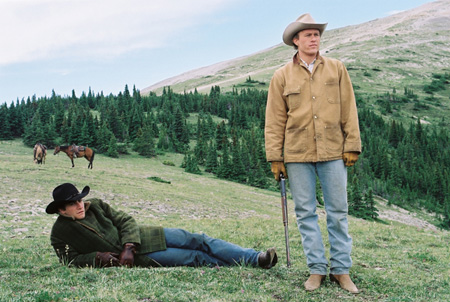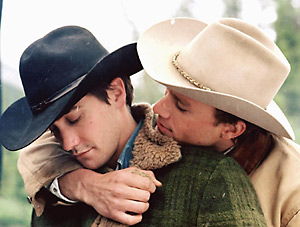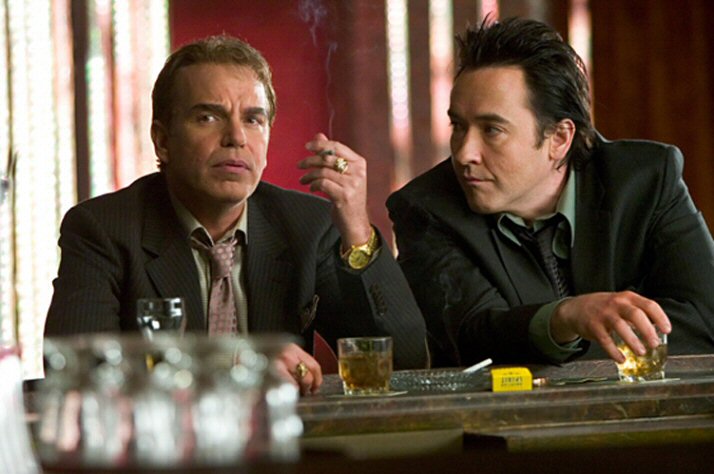
Brokeback Mountain, which I caught last night, is a somber, slow-moving, and ultimately rather mournful film, but a worthwhile one, and it’s a return-to-form for Ang Lee after his atrocious attempt at The Hulk. In fact, you can see shades of his Hulk, and particularly The Ice Storm, in this tale of two young men who meet, fall in love, and subsequently spend their lives trying to escape the constraints of society once or twice a year amid the photogenic peaks of Wyoming. All three Ang Lee films are stories about the calamitous consequences of repression, and how readily it can become redirected into anger, bitterness, and melancholy, with the elemental forces of the natural world as a backdrop. As such, Brokeback (which was filmed in Alberta) includes some amazing Western landscapes throughout. And, to borrow from my Cold Mountain review back in the day, they also act as a pretty solid metaphor for this film, which is absorbing and gorgeously shot, yet in the end also somewhat cool and remote.
Both the strength and the weakness of the film lies in Heath Ledger’s performance as Ennis Del Mar, the more reticent of the pair. (Jake Gyllenhaal is very good as Jack Twist, a much more communicative character — in a way, and particularly in the early scenes, when Gyllenhaal hoops and hollers like a natural-born extrovert, he doesn’t seem all that far removed from his recent stint in Jarhead.) Heath Ledger’s performance is engrossing, in part because you spend much of the film just trying to figure out what he’s thinking. At times, his character is taciturn to the point of being inarticulate. This speaks in favor of the film’s realism, I suppose — Ennis’s whole life after Brokeback is about caution, misdirection, and concealment. (As a child, Ennis is quite literally “scared straight” by his father, who goes out of his way to show him the gory consequences of an anti-gay hate crime.) At the same time, though, Ledger seems like he’s underplaying an underwritten character, and as such it becomes harder than it might should be to get inside his head and feel the story. (That being said, the very last scene in the film is a masterstroke, far more powerful than a somewhat similar sequence at the end of A History of Violence.)
So, how will this movie play in Middle America, where gay-camp has hit the mainstream (“Queer Eye,” “Will & Grace”) but, at least judging by ballot initiatives, gay marriage is still bizarrely considered a threat to the American way of life? To be honest, I don’t know. Perhaps the “gay cowboy” angle will keep people away, which would be unfortunate. Speaking of which, the “gay cowboy” thing is a bit of a misnomer — For one, they’re sheepherders, not cowboys; for another, they don’t identify themselves as gay or straight, so much as simply in love. That both partners are men is a quirk of Fate…At times, both are mystified by the powerful connection between them. And, one early sex scene excepted, the film is really rather staid about the relationship between the two. (As J. Hoberman noted, “Brokeback Mountain is the most straightforward love story — and in some ways the straightest — to come out of Hollywood, at least since Titanic.“) Yet, even in bluest of the blue NYC, many in the audience cracked up at the sight of Michelle Williams (Ledger’s real-life love interest, here his wife) catching Ennis and Jack in full embrace. And, as least as I could tell, there’s nothing funny about this scene of infidelity, and you could hardly say it was played for laughs.
At any rate, Williams and Anne Hathaway (as Jack’s wife) are both good here as well, although like Ennis they seem underwritten and (particularly Hathaway) at times inscrutable. (And keep an eye out for Anna Faris and Linda Cardellini, both of whom are actresses I root for and was surprised to see here…hopefully better roles will soon be in the offing for Lindsey Weir.) And that’s ultimately the modest problem with Brokeback Mountain, which is otherwise an excellent film — at times, it feels as somber, restrained, and delicate as Kabuki theater. Particularly in a film that warns of the dangers of bottling up passion, it’d be nice to have seen less Big Sky Country pageantry and more emotion from all the characters on-screen. If that wouldn’t have played in Peoria, so be it. Still, I think it would’ve made the central dilemma between our two lovers that much more trenchant and tragic if we glimpsed more potency of feeling from these often expressionless people. But perhaps that’s just the code of the West: As Ennis says, “If you can’t fix it, you gotta stand it.“



